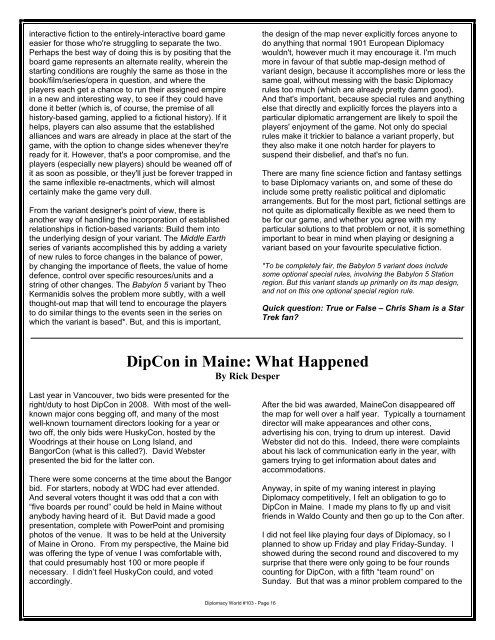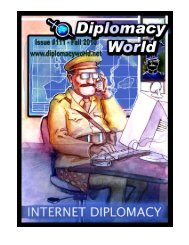Diplomacy World #103 - Fall 2008 Issue
Diplomacy World #103 - Fall 2008 Issue
Diplomacy World #103 - Fall 2008 Issue
You also want an ePaper? Increase the reach of your titles
YUMPU automatically turns print PDFs into web optimized ePapers that Google loves.
interactive fiction to the entirely-interactive board game<br />
easier for those who're struggling to separate the two.<br />
Perhaps the best way of doing this is by positing that the<br />
board game represents an alternate reality, wherein the<br />
starting conditions are roughly the same as those in the<br />
book/film/series/opera in question, and where the<br />
players each get a chance to run their assigned empire<br />
in a new and interesting way, to see if they could have<br />
done it better (which is, of course, the premise of all<br />
history-based gaming, applied to a fictional history). If it<br />
helps, players can also assume that the established<br />
alliances and wars are already in place at the start of the<br />
game, with the option to change sides whenever they're<br />
ready for it. However, that's a poor compromise, and the<br />
players (especially new players) should be weaned off of<br />
it as soon as possible, or they'll just be forever trapped in<br />
the same inflexible re-enactments, which will almost<br />
certainly make the game very dull.<br />
From the variant designer's point of view, there is<br />
another way of handling the incorporation of established<br />
relationships in fiction-based variants: Build them into<br />
the underlying design of your variant. The Middle Earth<br />
series of variants accomplished this by adding a variety<br />
of new rules to force changes in the balance of power,<br />
by changing the importance of fleets, the value of home<br />
defence, control over specific resources/units and a<br />
string of other changes. The Babylon 5 variant by Theo<br />
Kermanidis solves the problem more subtly, with a well<br />
thought-out map that will tend to encourage the players<br />
to do similar things to the events seen in the series on<br />
which the variant is based*. But, and this is important,<br />
<strong>Diplomacy</strong> <strong>World</strong> <strong>#103</strong> - Page 16<br />
the design of the map never explicitly forces anyone to<br />
do anything that normal 1901 European <strong>Diplomacy</strong><br />
wouldn't, however much it may encourage it. I'm much<br />
more in favour of that subtle map-design method of<br />
variant design, because it accomplishes more or less the<br />
same goal, without messing with the basic <strong>Diplomacy</strong><br />
rules too much (which are already pretty damn good).<br />
And that's important, because special rules and anything<br />
else that directly and explicitly forces the players into a<br />
particular diplomatic arrangement are likely to spoil the<br />
players' enjoyment of the game. Not only do special<br />
rules make it trickier to balance a variant properly, but<br />
they also make it one notch harder for players to<br />
suspend their disbelief, and that's no fun.<br />
There are many fine science fiction and fantasy settings<br />
to base <strong>Diplomacy</strong> variants on, and some of these do<br />
include some pretty realistic political and diplomatic<br />
arrangements. But for the most part, fictional settings are<br />
not quite as diplomatically flexible as we need them to<br />
be for our game, and whether you agree with my<br />
particular solutions to that problem or not, it is something<br />
important to bear in mind when playing or designing a<br />
variant based on your favourite speculative fiction.<br />
*To be completely fair, the Babylon 5 variant does include<br />
some optional special rules, involving the Babylon 5 Station<br />
region. But this variant stands up primarily on its map design,<br />
and not on this one optional special region rule.<br />
Quick question: True or False – Chris Sham is a Star<br />
Trek fan?<br />
DipCon in Maine: What Happened<br />
By Rick Desper<br />
Last year in Vancouver, two bids were presented for the<br />
right/duty to host DipCon in <strong>2008</strong>. With most of the wellknown<br />
major cons begging off, and many of the most<br />
well-known tournament directors looking for a year or<br />
two off, the only bids were HuskyCon, hosted by the<br />
Woodrings at their house on Long Island, and<br />
BangorCon (what is this called?). David Webster<br />
presented the bid for the latter con.<br />
There were some concerns at the time about the Bangor<br />
bid. For starters, nobody at WDC had ever attended.<br />
And several voters thought it was odd that a con with<br />
“five boards per round” could be held in Maine without<br />
anybody having heard of it. But David made a good<br />
presentation, complete with PowerPoint and promising<br />
photos of the venue. It was to be held at the University<br />
of Maine in Orono. From my perspective, the Maine bid<br />
was offering the type of venue I was comfortable with,<br />
that could presumably host 100 or more people if<br />
necessary. I didn’t feel HuskyCon could, and voted<br />
accordingly.<br />
After the bid was awarded, MaineCon disappeared off<br />
the map for well over a half year. Typically a tournament<br />
director will make appearances and other cons,<br />
advertising his con, trying to drum up interest. David<br />
Webster did not do this. Indeed, there were complaints<br />
about his lack of communication early in the year, with<br />
gamers trying to get information about dates and<br />
accommodations.<br />
Anyway, in spite of my waning interest in playing<br />
<strong>Diplomacy</strong> competitively, I felt an obligation to go to<br />
DipCon in Maine. I made my plans to fly up and visit<br />
friends in Waldo County and then go up to the Con after.<br />
I did not feel like playing four days of <strong>Diplomacy</strong>, so I<br />
planned to show up Friday and play Friday-Sunday. I<br />
showed during the second round and discovered to my<br />
surprise that there were only going to be four rounds<br />
counting for DipCon, with a fifth “team round” on<br />
Sunday. But that was a minor problem compared to the




